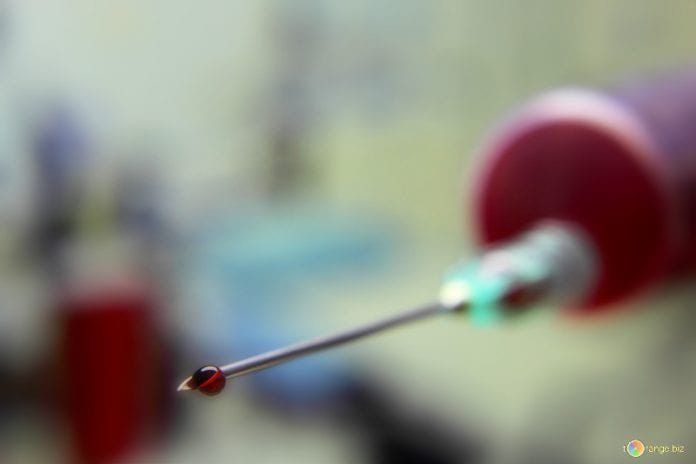Intensive care patients in Carmarthen and Llanelli have become the first in Wales to undergo a new laboratory blood test which helps doctors to manage antibiotic treatment in serious bacterial infections and sepsis.
Dr Igor Otahal, Consultant Anaesthetist and project lead, has been collaborating with Dr Peter Havalda, Consultant Anaesthetist and Dr Sian Hancock, Consultant Clinical Scientist, on Procalcitonin (PCT) testing.
The test, which has been trialled at Glangwili and Prince Philip hospitals, is currently only available at a few other locations in the UK. Hywel Dda was the first health board in Wales to offer it to intensive care patients potentially suffering from sepsis, and is currently reviewing a potential rollout across other Intensive Care Units.
PCT testing works by quickly establishing whether a patient has a bacterial infection which needs to be treated with antibiotics. By monitoring the course of infection with PCT, it is then possible to avoid giving patients antibiotics for longer than they need.
Previously, valuable antibiotics may have been given to patients with symptoms similar to bacterial infections, e.g. viral chest infections and acute heart failure, without a confirmed bacterial infection and sepsis.
The PCT test, which is carried out on routine blood samples, allows tailoring of antibiotics for individual patients rather than prescribing antibiotics over a set number of days. PCT is also more accurate than other ‘biomarkers’ such as white blood cell counts, which do not generally reflect trends in infection adequately.
Dr Otahal said the use of PCT testing in Intensive Care Units had led to much better antibiotic stewardship, with fewer patients treated with antibiotics inappropriately, and with shorter courses of antibiotics generally.
He added: “We are starting fewer antibiotic treatments unnecessarily for conditions that are not caused by bacteria; this impacts on the economics and development of resistances to valuable antibiotics too.
“There is a growing danger that bacteria attacked by inappropriate antibiotics will develop resistance, and we will have no effective antibiotic treatment for patients with serious infections and sepsis. It has already started – we have seen it in clinical practice. PCT helps the antibiotic stewardship with the fight against bacterial resistance.
“Another positive fact is that when we start the antibiotic treatment we see the PCT trend reflecting the right choice of antibiotics. It would peak initially, and then when the infection is under control with the appropriate antibiotics, the levels would fall.
“The PCT levels reflect the severity of infection as well and can add to the assessment of possible outcome. The last great thing is that when PCT levels fall significantly, we can stop using antibiotics much earlier compared to previously established routine, without the risk of the infection not being treated completely.
“The PCT test became a very welcome addition to our arsenal. It works best when interpreted in the clinical context. On its own PCT cannot replace other tests and clinical experience.”
“PCT testing is currently restricted to patients in Intensive Care Units but there is a growing sense of feasibility and usefulness which could trigger widespread use.
“In the future we would like to share our experience with consultants from other specialities, who could use it to the benefit of their patients at the start of the diagnostic and treatment process.”
Hywel Dda Medical Director Dr Phil Kloer added: “Procalcitonin testing is a new and very exciting form of research as it allows us to really study the effectiveness of antibiotic treatments in a way we haven’t been able to before, and we are grateful to Dr Otahal, Dr Havalda and Dr Hancock for their collaborative work on this project.
“Given the well-documented dangers of sepsis in particular, we are increasingly looking at a future where we need to find new and inventive ways of targeting conditions so that we can get patients back on their feet as soon as possible while also making the best use of our time and resources.”
———————————————————————————-
Cleifion mewn unedau gofal dwys yng Nghaerfyrddin a Llanelli yw’r cleifion cyntaf yng Nghymru i gael prawf gwaed newydd a archwilir mewn labordy, sy’n helpu meddygon i reoli triniaeth wrthfiotig mewn achosion o heintiau bacterol difrifol a sepsis.
Mae Dr Igor Otahal, yr Anesthetydd Ymgynghorol sy’n arwain y prosiect, wedi bod yn cydweithio â Dr Peter Havalda, Anesthetydd Ymgynghorol a Dr Sian Hancock, Gwyddonydd Clinigol Ymgynghorol ar brofion procalcitonin (PCT).
Mae’r prawf wedi’i dreialu yn Ysbyty Glangwili ac Ysbyty’r Tywysog Philip, a dim ond mewn ychydig o leoliadau eraill y mae ar gael ar hyn o bryd yn y DU. Hywel Dda oedd y bwrdd iechyd cyntaf yng Nghymru i gynnig y prawf i gleifion mewn unedau gofal dwys, a allai fod yn dioddef o sepsis, ac mae wrthi’n adolygu’r posibilrwydd o gyflwyno’r prawf mewn unedau gofal dwys eraill.
Mae’r prawf PCT yn gweithio drwy ddarganfod yn gyflym a oes gan glaf haint bacterol y mae angen ei drin â gwrthfiotigau. Drwy ddefnyddio’r prawf PCT i fonitro hynt yr haint, mae modd osgoi rhoi gwrthfiotigau i gleifion am fwy o amser nag sy’n angenrheidiol.
O’r blaen, gallai gwrthfiotigau gwerthfawr fod wedi’u rhoi i gleifion a oedd â symptomau tebyg i heintiau bacterol, e.e. heintiau firysol y frest a methiant acíwt y galon, heb gadarnhad bod y cleifion hynny’n dioddef o haint bacterol a sepsis.
Mae’r prawf PCT, a gyflawnir ar samplau gwaed arferol, yn ei gwneud yn bosibl i wrthfiotigau gael eu teilwra ar gyfer cleifion unigol, yn hytrach na’u bod yn cael eu rhagnodi dros nifer benodol o ddiwrnodau. Yn ogystal, mae’r prawf PCT yn fwy cywir na ‘bioarwyddion’ eraill megis cyfrifiadau celloedd gwyn y gwaed, nad ydynt yn adlewyrchu tueddiadau o ran haint yn ddigonol yn gyffredinol.
Dywedodd Dr Otahal fod defnyddio’r prawf PCT mewn unedau gofal dwys yn golygu bod gwrthfiotigau’n cael eu gwarchod yn well o lawer, bod llai o gleifion yn cael eu trin yn amhriodol â gwrthfiotigau, a bod cyrsiau byrrach o wrthfiotigau’n cael eu rhagnodi’n gyffredinol.
Ychwanegodd: “Rydym yn dechrau llai o driniaethau gwrthfiotig diangen ar gyfer cyflyrau nad ydynt yn cael eu hachosi gan facteria; mae hynny’n arwain at ganlyniadau ariannol ac yn fodd hefyd i arafu’r graddau y mae bacteria yn datblygu’r gallu i wrthsefyll gwrthfiotigau gwerthfawr.
“Ceir perygl cynyddol y bydd bacteria y mae gwrthfiotigau amhriodol yn ymosod arnynt yn datblygu’r gallu i wrthsefyll triniaeth wrthfiotig, ac na fydd gennym unrhyw driniaeth wrthfiotig effeithiol ar gyfer cleifion sy’n dioddef o heintiau difrifol a sepsis. Mae’r duedd honno wedi dechrau’n barod – rydym wedi’i gweld mewn ymarfer clinigol. Mae’r prawf PCT o gymorth i warchod gwrthfiotigau, ac mae hynny’n helpu i arafu’r graddau y mae bacteria yn datblygu’r gallu i wrthsefyll triniaeth wrthfiotig.
“Dyma ffaith gadarnhaol arall: pan fyddwn yn dechrau’r driniaeth wrthfiotig, gallwn weld lefelau PCT yn adlewyrchu’r dewis cywir o wrthfiotigau. Byddant yn cyrraedd eu hanterth i ddechrau, ac yna’n disgyn pan fydd yr haint yn cael ei reoli â’r gwrthfiotigau priodol.
“Mae lefelau PCT yn adlewyrchu difrifoldeb yr haint hefyd, a gallant ychwanegu at y broses o asesu canlyniad posibl. Y peth gwych olaf, pan fydd lefelau PCT yn disgyn yn sylweddol, yw y gallwn roi’r gorau i ddefnyddio gwrthfiotigau’n gynharach o lawer o gymharu â’r drefn arferol flaenorol, heb y risg o fethu â thrin yr haint yn llwyr.
“Mae’r prawf PCT wedi bod yn ychwanegiad derbyniol iawn at ein hystod o driniaethau. Mae’n gweithio orau pan gaiff ei ddadansoddi mewn cyd-destun clinigol. Ar ei ben ei hun, ni all y prawf PCT ddisodli profion eraill na phrofiad clinigol.”
“Mae’r prawf PCT wedi’i gyfyngu i gleifion mewn unedau gofal dwys ar hyn o bryd, ond mae natur ymarferol a defnyddiol y prawf yn dod yn fwyfwy amlwg a gallai hynny beri iddo gael ei ddefnyddio’n eang.
“Yn y dyfodol hoffem rannu ein profiad â meddygon ymgynghorol o feysydd arbenigol eraill, a allai ddefnyddio ein profiad er budd eu cleifion nhw ar ddechrau’r broses o ddiagnosio a thrin cyflyrau.”
Meddai Cyfarwyddwr Meddygol Hywel Dda, Dr Phil Kloer: “Mae’r prawf procalcitonin yn agwedd newydd a chyffrous iawn ar ymchwil, oherwydd mae’n ein galluogi i astudio effeithiolrwydd triniaethau gwrthfiotig yn wirioneddol, mewn modd nad oedd yn bosibl i ni o’r blaen, ac rydym yn ddiolchgar i Dr Otahal, Dr Havalda a Dr Hancock am eu gwaith ar y cyd ar y prosiect hwn.
“O gofio peryglon sepsis yn arbennig, sy’n hysbys i bawb, rydym yn wynebu dyfodol yn gynyddol lle bydd angen i ni ddod o hyd i ffyrdd newydd a dyfeisgar o dargedu cyflyrau er mwyn galluogi ein cleifion i wella cyn gynted ag sy’n bosibl, gan wneud y defnydd gorau o’n hamser a’n hadnoddau.”
Help keep news FREE for our readers
Supporting your local community newspaper/online news outlet is crucial now more than ever. If you believe in independent journalism, then consider making a valuable contribution by making a one-time or monthly donation. We operate in rural areas where providing unbiased news can be challenging. Read More About Supporting The West Wales Chronicle

























